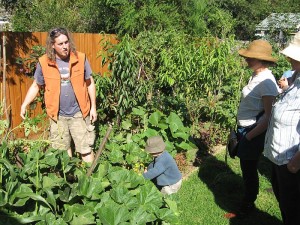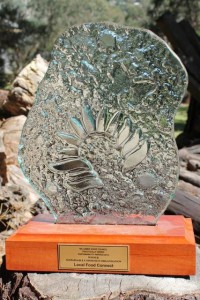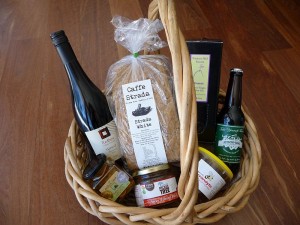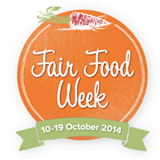Both Local Food Connect and Transition Banyule are running tours on the weekend of Nov 8 & 9. Details and booking details are below.
Greensborough/Diamond Creek Edible Garden Tour
10am-1pm Saturday November 8. This tour will only take 10 people.
Enjoy a guided tour of three gardens in Greensborough and Diamond Creek. The tour will begin at 10am in Greensborough and will finish at Diamond Creek at 1pm. At the first garden, a food swap will also be in progress in which tour participants are welcome to participate. Morning tea will be provided at the second garden. The tour is free, although a donation box for the Diamond Creek Thrive Community Garden may be offered at one garden. Here is a brief description of each garden. Bookings are essential.
Forest of Plenty
Begun two and a half years ago this suburban food forest, very close to the Plenty River in Greensborough, includes many fruit trees and perennial and annual food plants. The forest on a difficult, sloping site utilises gleaned neighbourhood mulch and lawn clippings along with compost and worm products produced from household organic waste. The key to this productive backyard food system is living soil!
The Garden of Plenty
The Garden of Plenty is a community garden attached to a public library in Greensborough. Many different groups covering all age groups have contributed to the development of this garden over the last few years. The garden includes wicking boxes, a worm farm and compost bin and a redeveloped lawn area. Water is captured using two different tank systems. The garden is the site for monthly food swaps, monthly garden club sessions and regular workshops with pre-school & school children. It is a popular space for visitors to the library to rest, relax or enjoy the produce.
Jenny’s food forest garden
Just 4 years ago, the front garden of this north facing Diamond Creek garden only had a large deciduous tree that died in the drought, lots of ivy and a few straggly shrubs. Now there are 13 fruit and citrus trees, nut bushes, kiwi vines, several varieties of berries and vegetables growing in this space, as well as natives and a variety of flowering plants. Around the back are 15 wicking boxes full of veggies, more fruit trees, grape and passionfruit vines, as well as chickens. Coffee and food scraps from a local café, plus green waste, is used to enrich the soil by being added to the compost bins.
Bookings are essential as there is a limit of 10. To book a spot on the tour, ring 0431 037810 or email info@localfoodconnect.org.au.
Banyule Edible Garden Tours, Sat 8 and Sun 9 November 2014
 To celebrate the season of growth and renewal, Transition Banyule offers a series of tours of local gardens growing edible produce.
To celebrate the season of growth and renewal, Transition Banyule offers a series of tours of local gardens growing edible produce.
Bookings are essential. Groups will be limited to 10 people per tour, so don’t delay in booking your place. Cost per tour $10/$5, children free, includes lunch. Book online here or email info@transitionbanyule.org.au or phone Penny on 9459 4209.
Below are descriptions of the five tours offered so generously by local residents. Many thanks to all the garden hosts and tour leaders! Addresses will be supplied when you have registered.
Tour locations and dates*:
- Tour 1: Watsonia/Macleod, Saturday 8 November, 9.30am-2pm.
- Tour 2: Heidelberg Heights, Saturday 8 November, 9.30am-2pm.
- Tour 3: Ivanhoe, Sunday 9 November, 10.00am-2.30pm.
- Tour 4: Heidelberg West, Sunday 9 November, 10.00am-2.30pm.
- Tour 5: Ivanhoe/Heidelberg, Sunday 9 November, 10.00am-2.30pm.
* Each tour includes lunch at the third garden, which is in Heidelberg Heights on Saturday and in Heidelberg on Sunday.
Tour 1: Watsonia/Macleod Saturday 8 November 9.30am-2pm
Ian and Heidi’s Garden
With a flourishing mixed orchard (front and back: fruit, nuts, berries and vines) and vegie garden based on permaculture principles. It’s in the process of replacing an ornamental garden with one where there’s always something fresh to eat.  Features include multi-grafted fruit trees, some uncommon varieties, simple berry propagation and bananas.
Features include multi-grafted fruit trees, some uncommon varieties, simple berry propagation and bananas.
Mala’s Garden
A garden demonstrating how to get started growing food in small spaces, using no dig method, replacing weed trees with fruit trees and utilising limited space. A new garden that has become remarkably productive in just three years.
Murundaka’s Garden (includes lunch)
Over the last 3 years since moving in, the Murundaka community has developed the community garden and composting system and the chook yard. They have an abundance of seasonal produce to feed not only the residents, but also visitors, sometimes holding workshops teaching people how to cook from the garden as well as core gardening skills. This garden demonstrates the use of secondhand materials such as pallets and bathtubs and is self-sufficient in compost made from their kitchen scraps and horse poo from Viewbank (pony club). They keep chickens for eggs and have started raising meat birds too. The garden is still in development, with an orchard in its infancy.
Tour 2: Heidelberg Heights, Saturday 8 November, 9.30am-2pm
NB: These gardens are near enough to each other for this tour to be walked.
Sue’s Garden
Backyard garden with lawn and established fruit trees, vegetables, chooks and compost, adapted to minimise heavy garden work. Vegie garden focuses on permanent crops and raised beds. Garden also influenced by family history and the challenges of birds, tree roots, a new puppy and a play area for grandchildren, and a shading multi rebuild next door. A bit of a hotchpotch that feels good to live in.
Jonathan’s Garden
An ongoing (6 year), one person, transformation of what was a standard suburban yard into an edible landscape, with fruit trees, nuts, companion and medicinal plants, vegetables and chickens. A key feature being the raspberry “driveway” and large number of strawberry plants.
Murundaka’s Garden (includes lunch)
 Over the last 3 years since moving in, the Murundaka community has developed the community garden and composting system and the chook yard. They have an abundance of seasonal produce to feed not only the residents, but also visitors, sometimes holding workshops teaching people how to cook from the garden as well as core gardening skills. This garden demonstrates the use of secondhand materials such as pallets and bathtubs and is self-sufficient in compost made from their kitchen scraps and horse poo from Viewbank (pony club). They keep chickens for eggs and have started raising meat birds too. The garden is still in development, with an orchard in its infancy.
Over the last 3 years since moving in, the Murundaka community has developed the community garden and composting system and the chook yard. They have an abundance of seasonal produce to feed not only the residents, but also visitors, sometimes holding workshops teaching people how to cook from the garden as well as core gardening skills. This garden demonstrates the use of secondhand materials such as pallets and bathtubs and is self-sufficient in compost made from their kitchen scraps and horse poo from Viewbank (pony club). They keep chickens for eggs and have started raising meat birds too. The garden is still in development, with an orchard in its infancy.
Tour 3: Ivanhoe, Sunday 9 November, 10.00am-2.30pm
McKern’s Garden
A purposefully designed garden to enhance a back yard and at the same time provide fruit, herbs and general vegetables. Orchard, with greens and edible herbs under trees, berries and snow pears for screening and making a good brew. Raised vegetable plots.
Angie’s Garden
This garden began to combine established ornamentals with edibles over three years ago. The focus has been to create a garden that has both the pretty and the practical – edible. Within the garden there are 15 wicking beds. Some are made from apple crates and others have been built from recycled timber pallets. A variety of garden beds as well. There is an aquaponics system with the tank set inground. A chook run down one side of the house, with a chook house built around a loquat tree from recycled timber. There are over 30 fruit trees, many are espeliered and some are in pots. There are 3 rotating compost bins and three free standing. A variety of places to sit and enjoy each setting. All on a standard house block. Solar panels, water tanks, fish and frog ponds.
Robert and Mary’s Garden (includes lunch)
Entire back lawn replaced by a flourishing vegie garden and orchard designed using permaculture principles. Front garden filled with dry tolerant indigenous, ornamental and productive plants, and a demonstration aquaponics system. Look out for the asparagus bed, the bananas in a greenhouse and the avocados.
Tour 4: Heidelberg West, Sunday 9 November, 10.00am-2.30pm
NB: These gardens are near enough to each other to travel by bicycle.
The Blackwoods – a busy family’s occasionally maintained rambling edible garden
With the first of more than 50 fruit trees planted in 2008 this garden is an ongoing experiment in high density, low maintenance urban fruit and vegetable production. Features include sugar cane, water plants, honey bees, backyard chooks, worm farm, wicking bed under mature trees, raised gardens built from recycled materials and low pressure irrigation with tank water. One of a collective of eight households that make up an informal community nicknamed ‘The Hood’ where the care of a herd of milking goats is shared by number of families.
Hibi Farm
Winner of the 2012 Darebin & Banyule Council’s Sustainability Awards (Home & Garden category), The Hibi Farm is a suburban block converted into a thriving hub of sustainable living. Bicycles and bike trailers are used for transport. Front and back yards have become orchard and vegetable gardens including raised garden beds with tank-fed irrigation system. The keeping of milking goats, poultry and bees are a conscious step towards increased self-sufficiency.
Robert and Mary’s Garden (includes lunch)
Entire back lawn replaced by a flourishing vegie garden and orchard designed using permaculture principles. Front garden filled with dry tolerant indigenous, ornamental and productive plants, and a demonstration aquaponics system. Look out for the asparagus bed, the bananas in a greenhouse and the avocados.
Tour 5: Ivanhoe/Heidelberg, Sunday 9 November, 10.00am-2.30pm
NB: These gardens are near enough to each other to travel by bicycle.
Susan and Mario’s Garden
Susan and Mario have been growing fruit and vegetables for over 25 years at their home in Heidelberg/Ivanhoe (recently rezoned). Over time they have had to replace old fruit trees but continue to maintain a range of trees and vines dotted throughout the ornamental part of the backyard. As gardeners Mario and Susan believe in the maintenance of the soil as the key to good organic gardening and their fertile soil built up over decades is the key to their success. They have kept chooks for more than 10 years and consider them to be an integral part of their approach to recycling and soil improvement. Mario and Susan garden throughout the year and attempt to plant in stages for constant supply, they grow almost everything from seed and are self-sufficient in a range of vegetables for their family of five.
Ken and Jenny’s Garden
This fruit and vegie garden includes a number of large raised wicking beds and a variety of fruit trees; garden pond; compost bins; chicken yard and run. It illustrates what can be done in a short time using the wonderful VEG (Very Edible Garden) service.
Robert and Mary’s Garden (includes lunch)
Entire back lawn replaced by a flourishing vegie garden and orchard designed using permaculture principles. Front garden filled with dry tolerant indigenous, ornamental and productive plants, and a demonstration aquaponics system. Look out for the asparagus bed, the bananas in a greenhouse and the avocados.
Remember to book online here or email info@transitionbanyule.org.au or phone Penny on 9459 4209.
 Local edible garden tours November 8 & 9
Local edible garden tours November 8 & 9
 Features include multi-grafted fruit trees, some uncommon varieties, simple berry propagation and bananas.
Features include multi-grafted fruit trees, some uncommon varieties, simple berry propagation and bananas. Over the last 3 years since moving in, the Murundaka community has developed the community garden and composting system and the chook yard. They have an abundance of seasonal produce to feed not only the residents, but also visitors, sometimes holding workshops teaching people how to cook from the garden as well as core gardening skills. This garden demonstrates the use of secondhand materials such as pallets and bathtubs and is self-sufficient in compost made from their kitchen scraps and horse poo from Viewbank (pony club). They keep chickens for eggs and have started raising meat birds too. The garden is still in development, with an orchard in its infancy.
Over the last 3 years since moving in, the Murundaka community has developed the community garden and composting system and the chook yard. They have an abundance of seasonal produce to feed not only the residents, but also visitors, sometimes holding workshops teaching people how to cook from the garden as well as core gardening skills. This garden demonstrates the use of secondhand materials such as pallets and bathtubs and is self-sufficient in compost made from their kitchen scraps and horse poo from Viewbank (pony club). They keep chickens for eggs and have started raising meat birds too. The garden is still in development, with an orchard in its infancy.


